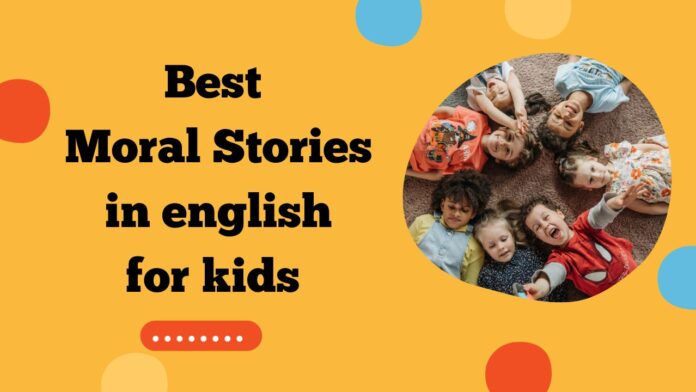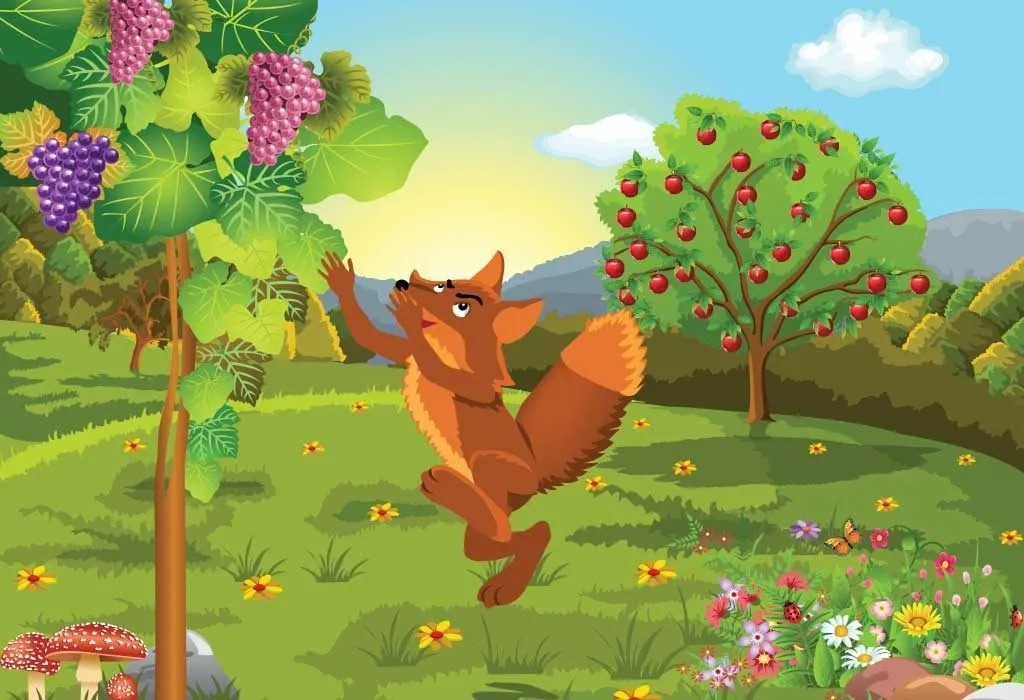Best Moral Stories in english for kids
1. The Ant and the Grasshopper – moral stories in english
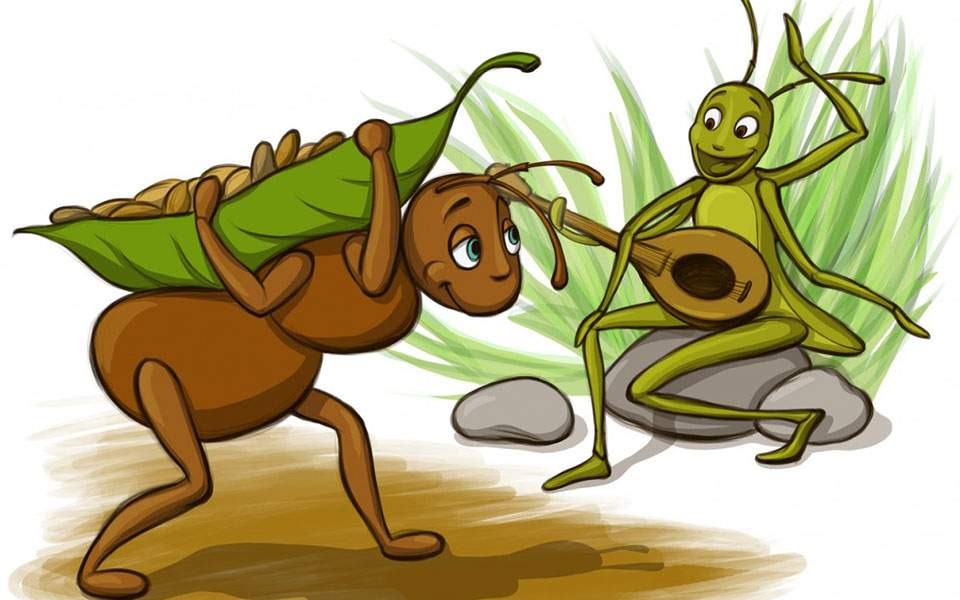
In a sprawling meadow nestled at the edge of a serene forest, there lived two distinct creatures: an industrious ant named Andy and a lively grasshopper named Gus. They were friends, despite their differences in temperament.
As the sun’s warm rays ushered in the bountiful days of spring, Andy the ant set about his daily routine with unwavering determination. He tirelessly gathered grains, seeds, and berries, carefully storing them in his underground abode. His days were consumed by focused labor, and his brow was perpetually furrowed with purpose.
Gus, on the other hand, was the embodiment of merriment. With a melodious tune always on his lips, he hopped from one blade of grass to another, reveling in the beauty of each moment. “Why worry about tomorrow?” he’d often chirp. “Let’s dance and sing while the sun shines!”
As the seasons shifted and summer’s embrace wrapped around the meadow, Andy’s storehouse grew full to bursting, while Gus continued his carefree melodies. He observed Andy’s unyielding work ethic but couldn’t fathom the need for such seriousness.
When autumn arrived, bringing with it whispers of cooler winds and the promise of a changing landscape, Andy’s preparations were complete. His pantry was stocked with ample supplies, ensuring his survival through the impending winter months.
Gus, however, started to feel the nip in the air. His melodies grew quieter as he struggled to find food in the increasingly barren meadow. One chilly evening, with the stars twinkling above, Gus approached Andy’s burrow, his wings drooping and spirit waning.
“Dear friend,” Gus humbly spoke, his voice a mere whisper of its former exuberance, “I fear I have underestimated the importance of your diligent ways. I find myself in need, with no food to sustain me through the cold months ahead.”
Andy gazed kindly at his friend, his heart heavy with empathy. “Gus,” he replied, “you are always welcome here. You see, I’ve learned that while dancing and singing bring joy to the heart, a balance of responsibility and preparation is essential for survival.”
With that, Andy opened his well-stocked pantry to Gus, and together, they shared a meal. As the winter storms raged outside, they spent their time telling stories and learning from each other’s experiences.
When spring finally returned, and the meadow blossomed anew, Gus had not only regained his strength but also a newfound appreciation for Andy’s wisdom. As the grasshopper danced and sang once more, he did so with a sense of purpose and responsibility. And beside him, Andy, too, joined in the joyful chorus, recognizing that there was room in life for both work and play.
From that day forward, the diligent ant and the carefree grasshopper lived as inseparable friends, their differences complementing each other, and their shared experiences reminding them that a harmonious balance could lead to a fulfilling life.
Moral: A balance of responsibility and preparation is essential for a fulfilling and sustainable life.
2. The Tortoise and the Hare – moral stories in english
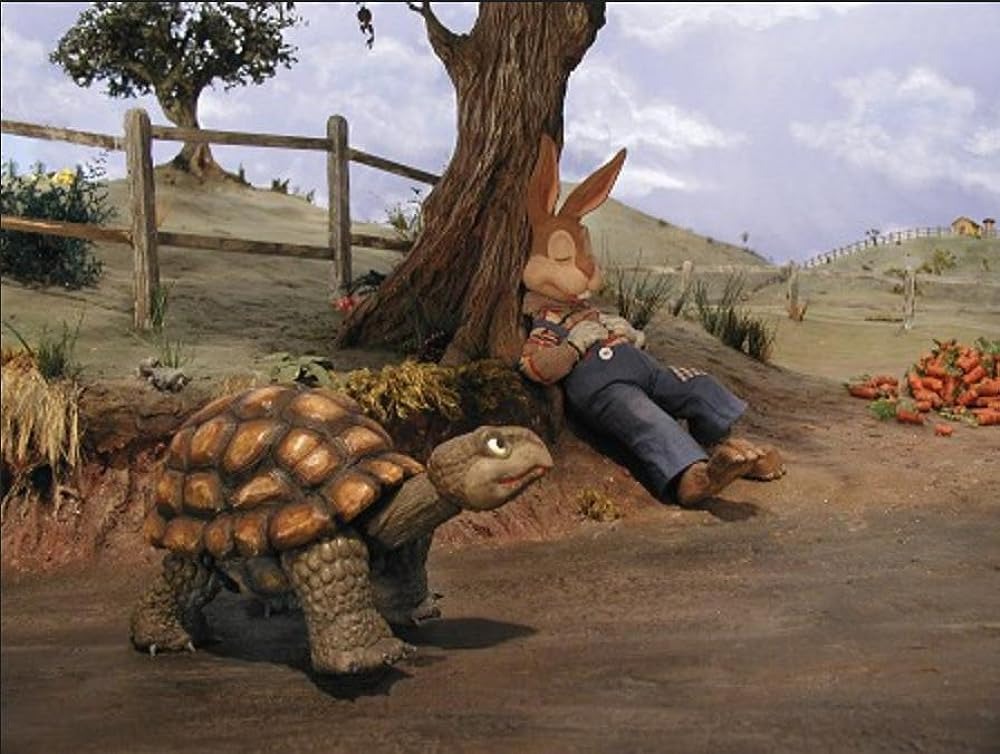
In a tranquil meadow bordered by a whispering forest, there dwelled two notable competitors: a patient tortoise named Tim and a swift hare named Harry. They were known throughout the land for their contrasting qualities and their fondness for racing.
One sunny morning, as the meadow’s wildflowers bloomed and the birds serenaded the day, a playful banter arose between Tim and Harry. “I can outrun you any day!” boasted Harry, his confident eyes gleaming with challenge.
Tim, with his steady demeanor, smiled and replied, “Perhaps, dear Harry, but speed isn’t the only factor in a race. Let us put it to the test and see who emerges victorious.”
The animals of the meadow gathered, intrigued by the proposition. The finish line was set, and the race was on. Harry shot forth like an arrow, his legs a blur as he raced ahead, leaving a trail of dust in his wake. Tim, however, lumbered forward at a slow and steady pace, his determination unwavering.
The onlookers cheered and marveled at the hare’s incredible speed, but as the race progressed, they noticed something remarkable. Harry, overcome by his own confidence, decided to take a brief rest beneath the shade of a tree. “I have plenty of time,” he chuckled to himself.
Meanwhile, Tim continued to plod along, his progress steady and unrelenting. He passed Harry, who was now napping peacefully, and in due time, reached the finish line.
As the animals erupted in cheers for Tim’s unexpected victory, Harry awoke with a start, realizing his folly. He dashed toward the finish line, but it was too late. The race had been won not by the swift, but by the steady.
Breathless and humbled, Harry approached Tim, his ears drooping. “Congratulations, Tim. You’ve shown me that patience and determination can triumph over even the swiftest of starts.”
Tim, true to his nature, smiled kindly and replied, “Thank you, Harry. Remember, it’s not just about how you start, but how you persevere and continue until the end.”
From that day onward, Harry carried with him the lesson he had learned from the patient tortoise. He still enjoyed his speed, but he also appreciated the value of consistency and tenacity.
As the seasons changed and the meadow flourished year after year, Tim and Harry often raced each other for the sheer joy of it. And though the outcomes varied, their friendship grew stronger, proving that even rivals could find common ground and respect for each other’s strengths.
Moral: Slow and steady wins the race, showing that patience, determination, and consistency can lead to victory.
3. The Boy Who Cried Wolf – moral stories in english
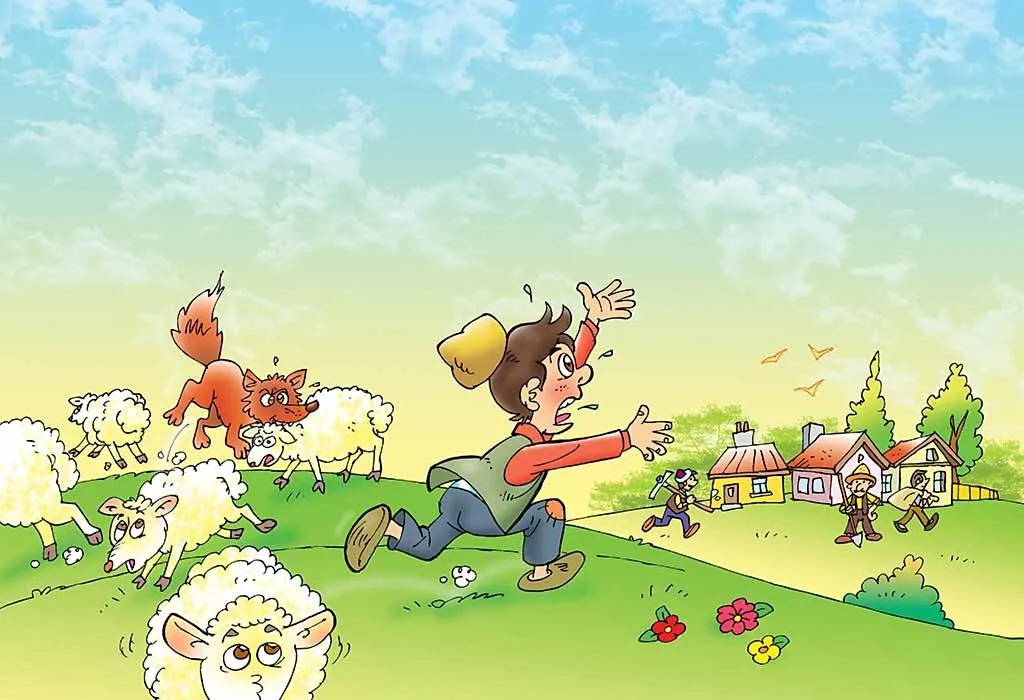
In a quaint village nestled at the foot of a lush hill, there lived a mischievous young shepherd named Liam. Liam was known throughout the village for his love of pranks and his penchant for weaving tales that often stretched the truth. Among his favorite pastimes was crying out that a fearsome wolf was attacking his flock of sheep, sending the villagers rushing to his aid, only to find no wolf in sight.
Each time, Liam would chuckle to himself as he watched the villagers shake their heads and return to their duties. However, as days turned into weeks, his cries for help grew more frequent, and the villagers began to feel exasperated.
One day, as the sun cast a golden hue over the hills and the sheep grazed contentedly, a genuine sense of unease swept over Liam. In the distance, he saw a shadow moving swiftly through the trees – a wolf! Panic gripped his heart as he realized the danger was real this time.
He dashed down the hill, his voice quivering with genuine fear. “Wolf! Wolf! Please help!” he cried, his words a desperate plea for assistance.
The villagers, hearing his cries, hesitated for a moment. They remembered the countless false alarms Liam had sounded before. But then, they saw the sheer terror in his eyes and heard the urgency in his voice. This time, they believed him.
They rushed up the hill, ready to face the wolf and protect Liam’s flock. Yet, when they reached the hilltop, all they found were sheep grazing peacefully. No wolf in sight.
Liam stood before them, tears in his eyes, realizing the gravity of his actions. “I’m so sorry,” he stammered, his voice barely above a whisper. “I’ve lied to you so many times, and now you don’t believe me even when I’m telling the truth.”
The villagers sighed, their faces a mix of concern and disappointment. “Liam, honesty is a precious virtue,” the village elder said gently. “Trust once broken is not easily mended. We want to help and believe you, but your past actions have made it difficult for us to know when you’re truly in need.”
Liam nodded, his heart heavy with regret. From that day forward, he resolved to mend his ways and earn back the villagers’ trust. He became a diligent and responsible shepherd, caring for his flock with sincerity and dedication.
And though the villagers remained cautious, they also recognized Liam’s efforts to change. Over time, their trust in him was restored, and the village learned that true honesty, once embraced, could overcome the consequences of past mistakes.
Moral: Honesty is important, as trust once broken is not easily regained.
4. The Fox and the Grapes
The Fox and the GrapesIn a lush forest, a sly and cunning fox named Felix roamed with an air of arrogance. He was known throughout the animal kingdom for his quick wit and clever tricks. One bright summer morning, Felix’s keen senses detected the scent of something delicious wafting through the air. Following his nose, he stumbled upon a vine laden with the plumpest, juiciest grapes he had ever seen.
Felix’s eyes gleamed with desire as he gazed at the tantalizing fruit. His mouth watered, and his mind raced with thoughts of the succulent feast that awaited him. Stretching his body to its full length, he leaped and pounced, trying to reach the grapes hanging high above him.
Time and again, Felix leaped with all his might, but the grapes remained just out of his reach. Frustration gnawed at him, and his pride began to take a hit. Yet, refusing to be defeated, he continued his efforts until exhaustion left him panting beneath the unattainable grapes.
Finally, breathless and defeated, Felix slumped to the ground. As he lay there catching his breath, a realization dawned upon him. These grapes were beyond his grasp, and no amount of jumping or stretching could change that fact.
With a sigh, Felix shook his head and muttered, “Those grapes must be sour anyway. I don’t need them.” He turned away from the grapes, feigning indifference, and walked off in search of other adventures.
As he journeyed deeper into the forest, Felix’s thoughts kept returning to the grapes. Despite his attempt to convince himself otherwise, he couldn’t shake the feeling that he had let his pride get the best of him. He had let his desire for the grapes blind him to the reality that he simply couldn’t reach them.
Days turned into weeks, and Felix’s encounter with the grapes lingered in his mind. He began to see his own arrogance in a new light, recognizing how it had clouded his judgment. He realized that instead of admitting his limitations, he had belittled what he couldn’t have.
Felix decided it was time for a change. He made an effort to be more humble, to acknowledge his shortcomings, and to approach situations with a willingness to learn rather than a desire to always prove himself. Over time, he earned the respect and trust of his fellow forest inhabitants, who admired his newfound wisdom and humility.
And so, the once-arrogant fox, humbled by a bunch of grapes, became a wiser and kinder creature, teaching all who knew him that sometimes, acknowledging one’s limitations and showing humility could lead to a greater understanding of oneself and the world around them.
Moral: Belittling what you cannot have is a sign of pride; humility helps us accept our limitations and learn from them.
5. The Lion and the Mouse
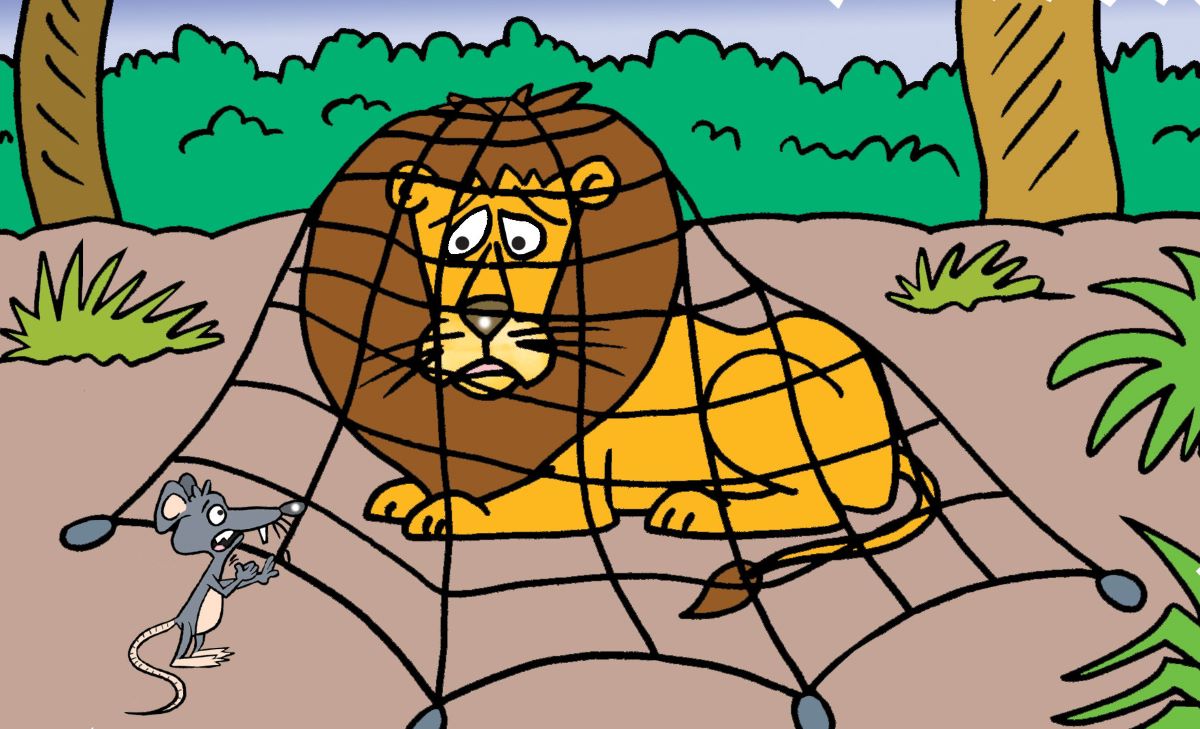
In the heart of a sprawling savannah, where golden grasses danced in the warm breeze, lived a mighty lion named Leo. His presence commanded respect from all creatures, as he roamed the land with confidence and strength. But even in the grandeur of Leo’s kingdom, there lived a small and inconspicuous creature – a tiny mouse named Mia.
One bright morning, as the sun’s rays painted the landscape with shades of amber and gold, Leo was basking in the sun’s warmth. Nearby, Mia observed the majestic lion from a safe distance, marveling at his power and grace.
Curiosity and a touch of bravery nudged Mia forward, and she ventured closer to Leo’s lair. In a moment of unexpected misfortune, her tiny paw slipped, and she found herself trapped beneath a massive paw – Leo’s mighty paw.
Leo regarded the tiny mouse beneath him, his eyes reflecting surprise and curiosity. “Well, what do we have here?” he rumbled, his voice a mixture of amusement and astonishment.
Terrified but determined, Mia mustered her courage and spoke softly, “Please, mighty Leo, spare me. I am small and feeble, but I promise that one day, I may be able to help you as you’ve helped me.”
Leo, intrigued by the mouse’s plea, lifted his paw. Mia scurried away, her heart racing but her spirit unbroken.
Months passed, and Leo’s memory of the encounter began to fade. One day, as he was prowling through the savannah, his powerful paws became ensnared in a hunter’s net. Roaring with frustration and anger, Leo struggled to break free, his efforts only tightening the net’s grip.
Mia, who had watched from a distance, saw Leo’s plight. With a determined heart, she darted towards the trapped lion. Using her sharp teeth, she gnawed and chewed at the net’s ropes. Slowly but surely, the net began to unravel.
After what felt like an eternity, Mia’s persistence paid off – the last strand snapped, and Leo was free. The relieved lion gazed at the tiny mouse in awe and gratitude.
“Thank you, Mia,” Leo said, his voice full of respect. “You’ve taught me that even the smallest of beings can make a significant difference.”
From that day forward, Leo and Mia forged an unlikely but unbreakable bond. They became the unlikeliest of friends, teaching the animals of the savannah that true strength wasn’t solely determined by size or power, but by the kindness and willingness to help one another.
Moral: Kindness and compassion can transcend size and strength, reminding us that every individual has the potential to make a significant impact.
6. The Goose with the Golden Eggs
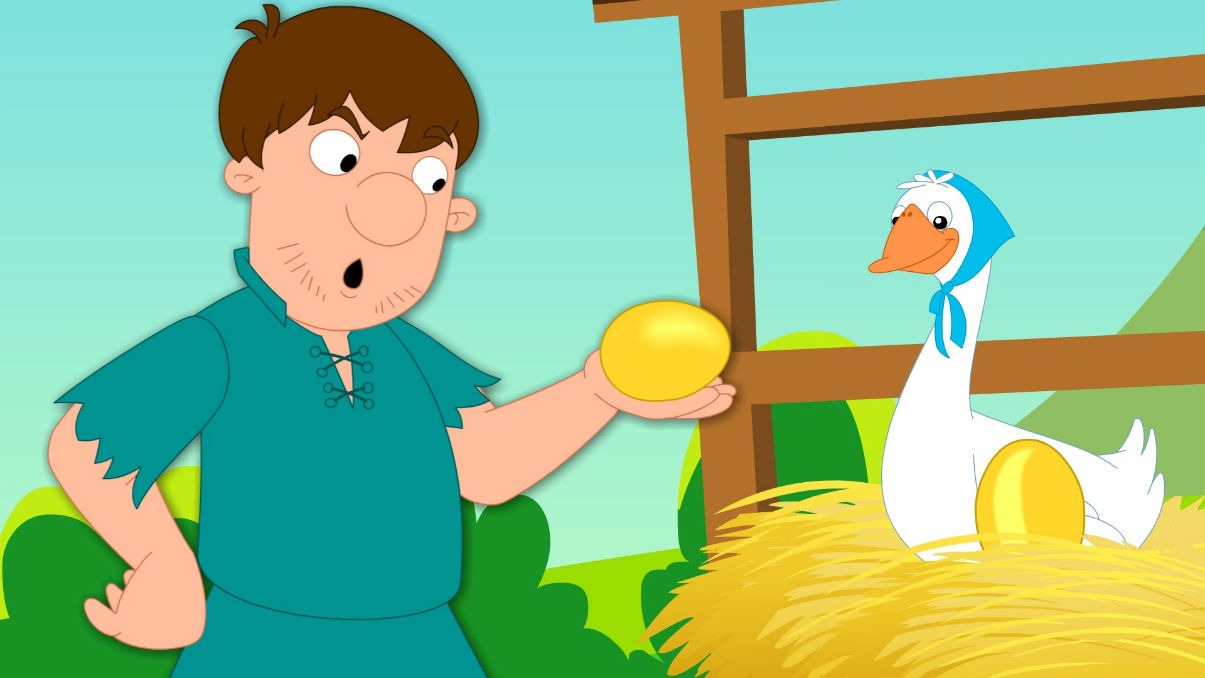
In a peaceful village nestled between rolling hills and lush meadows, there lived a humble farmer named Jack. Jack’s most prized possession was his farm, where he tended to his animals and crops with unwavering dedication. However, his most extraordinary treasure was a goose unlike any other.
One day, as Jack was performing his usual chores, he discovered that his beloved goose had laid a single egg. To his astonishment, the egg was made of pure gold! Overwhelmed with joy, he rushed to the village to share his discovery with the townspeople.
Word of the remarkable golden egg spread like wildfire, and soon, the entire village was buzzing with excitement. Jack became an overnight sensation, and people traveled from far and wide to witness the magical goose for themselves.
With each passing day, the goose continued to lay golden eggs, bringing boundless wealth to Jack and his family. The once-modest farmer found himself living a life of luxury, surrounded by opulence and extravagance.
As time went on, however, Jack’s desire for more grew insatiable. He became consumed by greed, thinking that if one golden egg could bring him such wealth, surely more eggs would make him unimaginably rich. Impatient and blinded by his avarice, Jack made a decision that would forever change his life.
One morning, he awoke with a plan. Convinced that there must be a way to get all the golden eggs at once, he grabbed a knife and approached the goose with a heart full of greed. He believed that by opening the goose, he could uncover the source of its golden treasure.
With a swift and careless motion, Jack cut open the goose’s belly, only to find… nothing. No golden eggs, no treasure, just a lifeless goose. His heart sank, and regret washed over him like a cold wave. In his pursuit of instant wealth, he had lost the very thing that had brought him prosperity.
The village soon learned of Jack’s reckless act, and a solemn mood settled over the once-joyful community. The tale of the goose with the golden eggs served as a poignant reminder of the consequences of unchecked greed.
Jack, humbled and remorseful, realized the true value of his former treasure. He vowed to learn from his mistake and work diligently on his farm, nurturing the land and caring for his animals as he had done before.
Through hard work and a newfound appreciation for the simple joys of life, Jack was able to rebuild his farm and regain the respect of his fellow villagers. And while the goose was gone, the lessons it left behind endured, reminding all who heard the story that true wealth was not found in gold, but in the values of contentment, gratitude, and moderation.
Moral: The tale of the goose with the golden eggs teaches us that unchecked greed can lead to the loss of what is truly valuable in life. Contentment and gratitude for what we have are the greatest treasures of all.
7. The Wise Old Owl
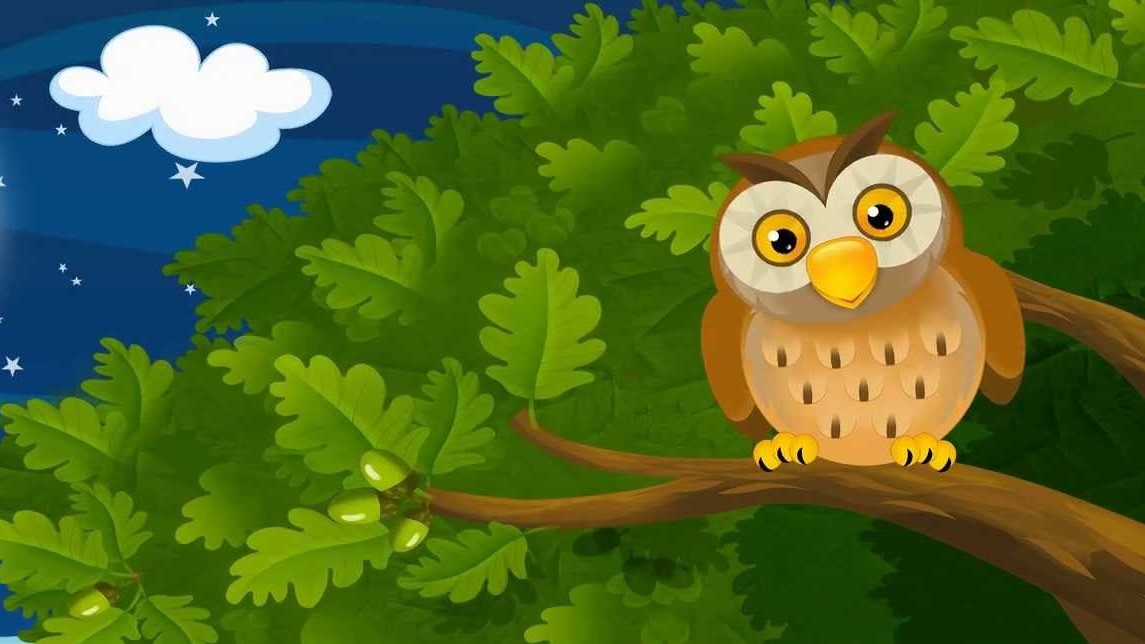
In the heart of a sprawling forest, where ancient trees stood tall and wise, lived a venerable old owl named Oliver. With feathers as white as freshly fallen snow and eyes that gleamed with ancient knowledge, Oliver was revered by all the creatures of the woods as the wisest of them all.
Each evening, as the sun dipped below the horizon and the sky was painted with hues of orange and gold, Oliver would perch upon a sturdy branch, ready to share his wisdom with those who sought his guidance.
One such evening, a young squirrel named Sammy scampered up the tree, his curiosity piqued by the tales of the wise old owl. With an eager heart and wide eyes, Sammy looked up at Oliver and asked, “Wise old owl, can you tell me the secret to living a fulfilled and meaningful life?”
Oliver hooted softly, his eyes reflecting the shimmering stars above. “Dear Sammy,” he began, “the secret to a meaningful life lies not in seeking external treasures or grand adventures, but in embracing the lessons that life itself presents to you.”
Sammy tilted his head, his interest piqued. “What do you mean, wise old owl?”
Oliver’s gaze never wavered as he spoke. “Life is a journey, and along the way, you will encounter moments of joy and sorrow, success and failure. Embrace both, for they are the threads that weave the tapestry of your existence.”
He continued, “Learn from the mistakes of the past, but do not dwell on them. Instead, let them guide you toward a wiser future. Celebrate your victories, but remain humble, remembering that the pursuit of knowledge is an endless path.”
Sammy listened intently, absorbing the wisdom that flowed from Oliver’s words. “And what of dreams, wise old owl? Should I chase after them with all my might?”
Oliver blinked slowly, his voice soothing as he replied, “Dreams are the lanterns that light your path, Sammy. Pursue them with passion and dedication, but always remain adaptable and open to new directions. A rigid focus on a single dream may blind you to the beauty of other opportunities.”
As the night deepened and the moon cast a silvery glow upon the forest, Sammy felt a profound sense of gratitude for Oliver’s guidance. He thanked the wise old owl and promised to carry his words in his heart.
With newfound clarity, Sammy descended the tree and ventured back into the forest, his steps guided by the wisdom of the wise old owl. Over the years, he faced challenges and triumphs, always remembering the lessons shared on that starlit evening.
And so, the wisdom of the wise old owl continued to ripple through the lives of those who sought it, reminding them that true fulfillment was found not in grand pursuits, but in the art of embracing life’s lessons and living each day with purpose and gratitude.
Moral: The wisdom of the wise old owl teaches us that a meaningful life is built upon embracing life’s lessons, learning from both successes and failures, and pursuing dreams with dedication while remaining open to new opportunities.
8. The Frog and the Scorpion – moral stories in english

In a tranquil pond nestled deep within a dense forest, lived a cheerful and lively frog named Felix. Felix spent his days leaping from lily pad to lily pad, croaking joyfully to the rhythm of the wind and water. He was admired by the other creatures of the pond for his kindness and his ability to find joy in the simplest of things.
One summer day, as the sun’s rays danced upon the water’s surface, a scorpion named Selena approached the edge of the pond. Her sleek black exoskeleton gleamed in the sunlight, and her stinger poised menacingly above the water.
“Good day, Selena,” Felix greeted, his voice warm and friendly. “What brings you to our pond?”
Selena hesitated, her eyes wary. “I am in need of help, Felix. I must cross this pond to reach my family on the other side, but I fear I will drown. Can you help me?”
Felix blinked, his concern evident. “But Selena, you are a scorpion, and I am a frog. You have a stinger that could harm me.”
Selena’s voice softened. “I understand your apprehension, Felix, but I promise you, if you help me cross, I will not harm you. My survival depends on reaching my family, and I would be forever grateful for your assistance.”
Moved by Selena’s plea and choosing to believe in her sincerity, Felix agreed to help. With cautious determination, he allowed Selena to climb onto his back. As he swam across the pond, Selena held onto Felix tightly, her stinger poised safely above the water.
Midway through their journey, the water began to grow rough, and the weight of Selena on his back became increasingly challenging for Felix. Panic coursed through his veins as he felt his strength wane.
“Selena, please, you mustn’t sting me,” Felix implored, his voice quivering with fear.
Selena’s eyes softened, and she reassured him, “I gave you my word, Felix. I will not harm you.”
With renewed determination, Felix pushed forward, his every leap a testament to his unwavering trust in Selena’s promise. Finally, they reached the opposite shore, both exhausted but safe.
As Selena climbed off Felix’s back, tears welled up in his eyes. “Thank you, Felix,” she whispered, her voice filled with gratitude. “You have shown me kindness despite my nature, and I will never forget it.”
With a nod of understanding, Felix watched as Selena disappeared into the forest, her promise fulfilled.
Weeks turned into months, and one day, as Felix basked in the warmth of the sun, he heard a familiar voice. It was Selena, her appearance transformed by a newfound sense of humility.
“I owe you my life, Felix,” Selena confessed, her eyes downcast. “And in return for your kindness, I have vowed to change my ways.”
True to her word, Selena had turned her venomous stinger inward, rendering herself harmless. The unlikely alliance between the frog and the scorpion had sparked a change in Selena’s heart, and she now dedicated herself to helping others instead of causing harm.
And so, the pond became a symbol of unity and transformation, where the kindness of a frog had the power to change the destiny of a scorpion. Their story spread throughout the forest, reminding all who heard it that even the unlikeliest of allies could inspire change and compassion in the hearts of others.
Moral: The tale of the frog and the scorpion illustrates that kindness and trust have the power to transform even the most unlikely of alliances and inspire positive change in the hearts of those who may seem unredeemable.
9. The Farmer and the Stork
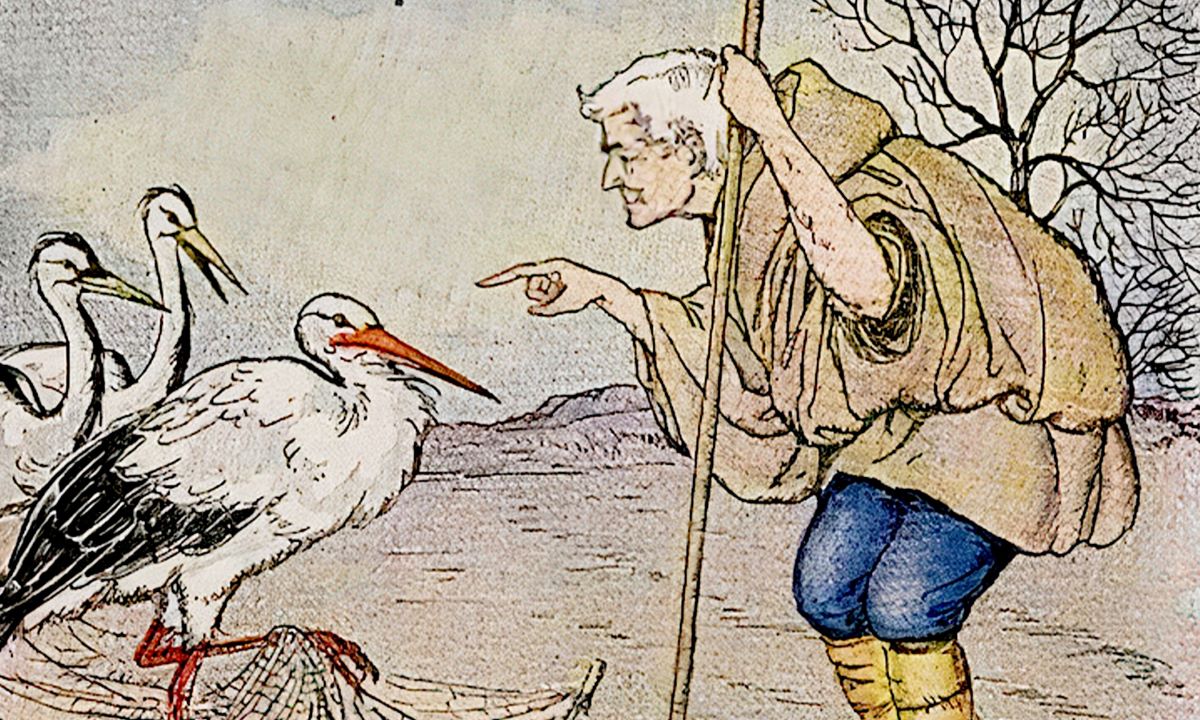
A farmer named John tended to his bountiful fields with care, reaping the rewards of his hard work. One day, as he surveyed his land, he noticed a stork leisurely pecking at the soil, enjoying the grains scattered by his labor.
John’s patience wore thin as he saw the stork feasting on his crops. “You ungrateful bird!” he exclaimed, shooing the stork away. “I toil day and night to nurture these fields, and you reap the benefits without any effort!”
The stork, unperturbed by John’s frustration, spread its wings and took flight. With a gentle and wise voice, it replied, “Dear farmer, while it is true that you have sown these fields, remember that the earth is meant to be shared by all creatures. Your efforts provide not only for you, but also for me and countless others who depend on its bounty.”
John paused, his anger subsiding as the stork’s words sank in. He realized the truth in what the stork had said – the interconnectedness of all life and the importance of sharing nature’s gifts.
As the seasons turned, John’s perspective shifted. He decided to set aside a small portion of his fields for the creatures of the air and land. He scattered grains for the birds, created shelters for the animals, and ensured that the ecosystem thrived alongside his crops.
One evening, as the sun painted the sky with hues of orange and pink, the stork returned to the farmer’s fields. It observed the harmony between the land and its inhabitants, a testament to John’s newfound understanding.
“Thank you, dear farmer,” the stork said, its eyes filled with gratitude. “Your generosity has created a haven for us all, a place where nature’s balance is respected and upheld.”
John smiled, his heart lighter than it had ever been. He realized that his partnership with nature not only benefited him, but also enriched the lives of the creatures that shared his land.
And so, the farmer and the stork became unlikely allies, teaching all who witnessed their harmony the valuable lesson that a harmonious coexistence with nature, rooted in empathy and understanding, can yield abundant rewards for all beings.
Moral: The story of the farmer and the stork reminds us of the importance of sharing and coexisting harmoniously with nature. Our actions have far-reaching effects, and by showing empathy and generosity, we create a world where all creatures can thrive.
10. The Greedy Dog – moral stories in english

In a bustling village, there lived a dog named Max. Max was known far and wide for his insatiable greed. He would often roam the streets in search of food, his eyes constantly darting to spot any morsel he could devour.
One sunny morning, Max’s search for food led him to a bustling market. The enticing aroma of freshly baked goods wafted through the air, captivating his senses. Unable to resist his gluttonous desires, Max sneaked into a bakery and devoured a loaf of bread.
With his belly full and a smug smile on his face, Max turned to leave. But as he attempted to exit through the same window he had entered, he realized that his head was now stuck in the bread bag. Panic surged through him as he tugged and pulled, but the bag only tightened its grip.
Max stumbled through the village, his predicament causing amusement among the villagers. They laughed and pointed at the sight of the greedy dog with a bread bag over his head.
Finally, Max reached a pond at the edge of the village. Desperate to rid himself of the bag, he leaped into the water with all his might. The bag slipped off his head, and Max emerged from the water dripping wet but free from the confines of his self-inflicted trap.
As Max stood by the pond, catching his breath and nursing his wounded pride, a wise old dog named Oscar approached. Oscar had witnessed the entire ordeal and now regarded Max with a mixture of sympathy and amusement.
“Max,” Oscar said gently, “your greed has brought you embarrassment and discomfort. You see, in your pursuit of immediate gratification, you failed to consider the consequences of your actions.”
Max hung his head, a flush of embarrassment coloring his cheeks. “You’re right, Oscar. My greed has always gotten the best of me.”
Oscar nodded sagely. “Remember, Max, the path of greed leads to more trouble than reward. It’s important to appreciate what you have and not let your desires cloud your judgment.”
From that day forward, Max took Oscar’s words to heart. He learned to savor his meals, grateful for each bite, and he stopped chasing after every fleeting desire. Over time, his reputation as a greedy dog waned, replaced by one of wisdom and moderation.
And so, the once-greedy dog learned a valuable lesson – that true contentment and happiness were found in appreciating life’s simple pleasures and practicing self-control.
Moral: The story of the greedy dog teaches us that greed and excessive desires can lead to trouble and embarrassment. Practicing moderation and appreciating what we have can lead to a more fulfilling and contented life.
11. The Wind and the Sun
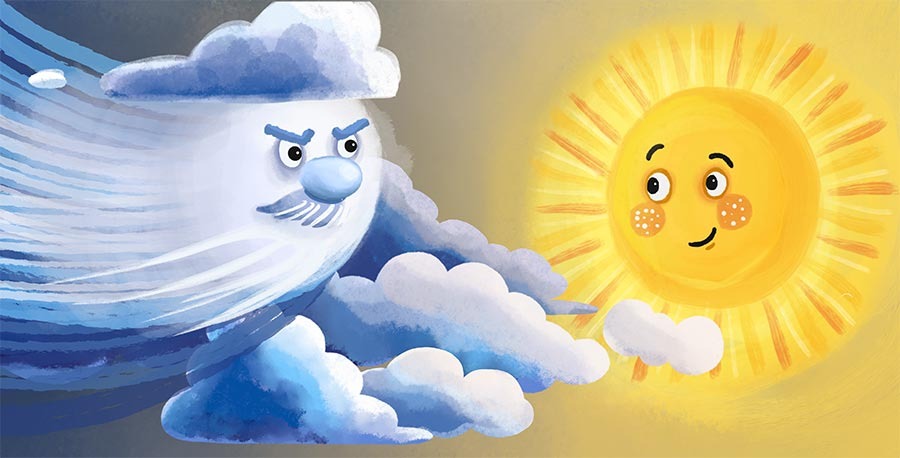
In the vast expanse of the sky, the Wind and the Sun often engaged in friendly banter about their abilities. One day, as they watched the world below, the Wind remarked, “I am the strongest force in nature. My powerful gusts can uproot trees and push ships across oceans!”
The Sun, with a warm smile, replied, “Strength is not the only measure of greatness, my dear Wind. I can warm the coldest hearts and bring life to every corner of the earth.”
Playful and curious, the Wind proposed a friendly contest. They spotted a traveler walking on a dusty road and decided to settle their debate by seeing who could make the traveler remove his heavy coat.
The Wind went first, blowing with all its might. It howled and whistled, creating a forceful gale that tugged at the traveler’s coat. But the more the Wind blew, the tighter the traveler clung to his coat, determined to stay warm.
As the Wind’s efforts proved fruitless, the Sun stepped in. It beamed its gentle rays onto the traveler, enveloping him in a comforting warmth. The traveler’s shivers gradually subsided, and he felt the pleasant embrace of the Sun’s rays.
The Sun’s warmth became more inviting by the minute, and the traveler, feeling comfortable, willingly removed his coat. He smiled, basking in the Sun’s gentle touch.
The Wind conceded defeat, realizing that its forceful approach had failed. “You were right, dear Sun,” the Wind admitted. “Your warmth and kindness were more persuasive than my strength.”
The Sun nodded graciously, and together they watched as the traveler continued his journey, now unburdened by his heavy coat.
And so, the Wind and the Sun learned that true power lay not in force, but in gentleness and warmth. Their friendly contest taught them and all who witnessed it that a kind and inviting approach could achieve what strength alone could not.
Moral: The story of the Wind and the Sun teaches us that kindness and warmth can be more persuasive than force. It reminds us that gentleness and compassion can achieve what strength and power cannot, fostering understanding and cooperation.
12. The Boy and the Filberts – moral stories in english
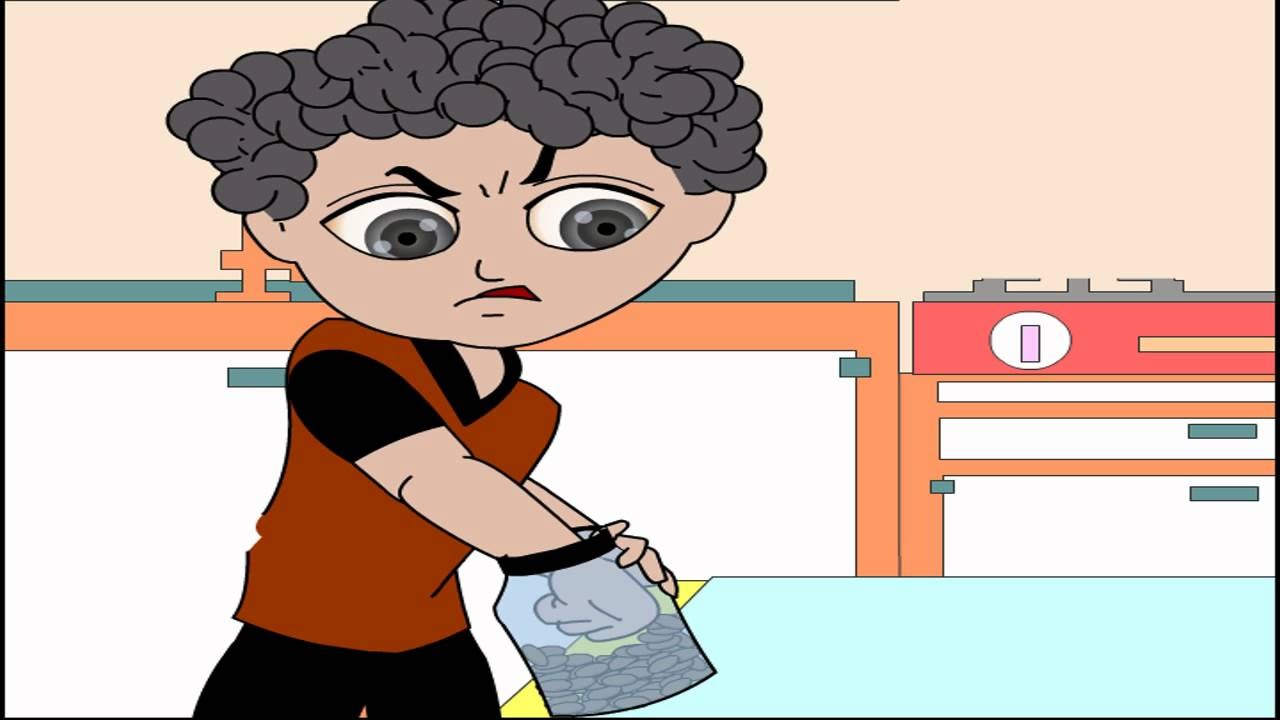
In a quaint village nestled between rolling hills and lush meadows, lived a curious and mischievous boy named Liam. One sunny day, as he roamed the outskirts of the village, Liam stumbled upon a large tree laden with plump filberts, also known as hazelnuts.
His eyes widened with delight as he gazed at the tree’s bountiful harvest. Unable to resist the temptation, he reached up and plucked a handful of filberts. He eagerly cracked one open and tasted its sweet and nutty goodness.
The taste was so delightful that Liam’s self-control wavered, and he quickly filled his pockets with filberts. Greedily, he kept picking more, the promise of an endless treat blurring his judgment.
With his pockets heavy and his stomach satisfied, Liam decided to head back to the village. However, as he turned to leave, he realized that he had indulged far more than he could carry. The weight of the filberts in his pockets made walking difficult, and he stumbled and struggled under their burden.
After a short distance, Liam’s steps became slow and labored. He found a comfortable spot beneath a tree and sat down, his pockets still bulging with filberts. As he rested, he realized that his eagerness and lack of moderation had led to his predicament.
Feeling defeated and slightly embarrassed, Liam decided to seek help. He called out to a passing farmer, who noticed Liam’s plight and approached with a knowing smile.
“Having trouble, young lad?” the farmer asked kindly.
Liam sighed and nodded, his cheeks tinged with embarrassment. “Yes, sir. I was so excited by the filberts that I couldn’t stop picking them. Now I’m stuck with too many to carry.”
The farmer chuckled softly and offered a solution. “Sometimes, Liam, a little self-control goes a long way. Had you picked only what you needed, you could have enjoyed the filberts without burdening yourself.”
With the farmer’s guidance, Liam emptied his pockets of excess filberts and filled a small basket with the remaining ones. As he walked back to the village, he realized the value of moderation and how his unchecked desires had led to unnecessary difficulties.
Liam shared his experience with his friends and family, and from that day onward, he practiced self-control and moderation in all aspects of his life. The story of the boy and the filberts served as a reminder to the village that enjoying life’s pleasures in moderation led to greater contentment and ease.
Moral: The story of the boy and the filberts teaches us the importance of self-control and moderation. It reminds us that indulging in excess can lead to unnecessary difficulties, and that appreciating life’s pleasures in a balanced manner leads to greater contentment and fulfillment.
13. The Elephant and the Blind Men
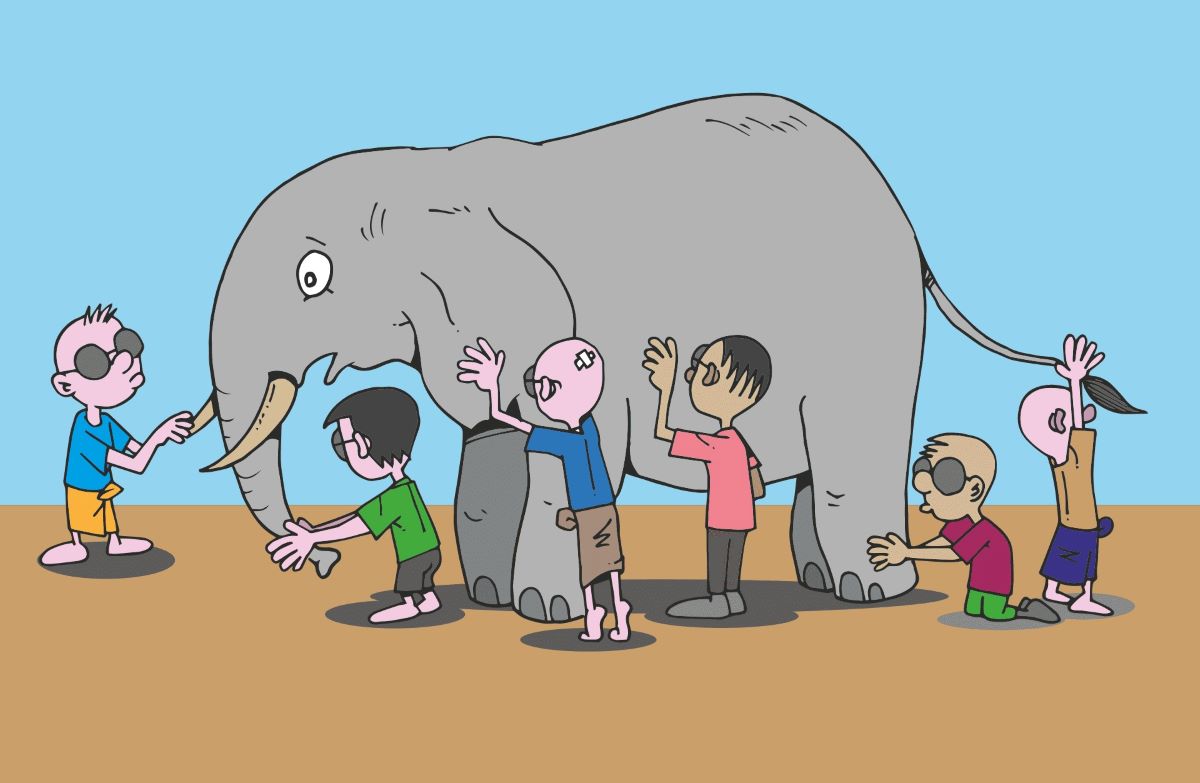
In a tranquil village, nestled at the edge of a vast forest, lived a wise and gentle elephant named Ella. Ella was known throughout the land for her wisdom and kindness, and villagers often sought her counsel in times of need.
One bright morning, as the sun’s rays filtered through the leaves of the ancient trees, a group of blind men arrived at the village. They had heard tales of Ella’s wisdom and wished to experience her guidance firsthand.
The villagers welcomed the blind men and led them to Ella’s dwelling. The blind men gathered around the majestic elephant, their hands gently exploring her massive form. Each man touched a different part of Ella – her trunk, her legs, her ears, and her tail.
After spending some time feeling Ella’s presence, the blind men sat down to share their observations with each other. The man who had touched Ella’s trunk spoke first, “Ella is like a long, flexible snake.” The man who had touched her leg disagreed, “No, she’s sturdy and strong, like a massive tree trunk.”
As the blind men described their individual perceptions, they began to argue about the true nature of the elephant. Each was convinced that their perspective was correct, and they couldn’t comprehend how others saw things differently.
Ella, who had been listening quietly, finally spoke with a gentle smile. “Dear friends, each of you has touched a part of me, but none of you has experienced the elephant in its entirety. I am more than just a trunk, legs, ears, or tail. To understand me fully, you must consider all the parts together.”
The blind men fell silent, their realization sinking in. They had been so focused on their limited perceptions that they had missed the bigger picture.
Ella continued, “Life, like me, is complex and multifaceted. It’s important to approach it with an open mind and an understanding that everyone’s perspective contributes to the complete picture.”
The blind men nodded in agreement, humbled by Ella’s wisdom. They thanked her for the lesson and left the village with a newfound appreciation for the diversity of viewpoints in the world.
As word spread of the encounter between the blind men and the wise elephant, the villagers reflected on the importance of empathy, understanding, and the value of considering multiple perspectives. The story of the elephant and the blind men became a cherished tale, reminding all who heard it that true wisdom lay in embracing the diversity of experiences and viewpoints that make up the fabric of life.
Moral: The story of the elephant and the blind men teaches us the importance of empathy, open-mindedness, and understanding. It encourages us to recognize that every individual’s perspective contributes to a broader understanding of the world, and embracing diverse viewpoints enriches our own wisdom.
14. The Miller, His Son, and the Donkey
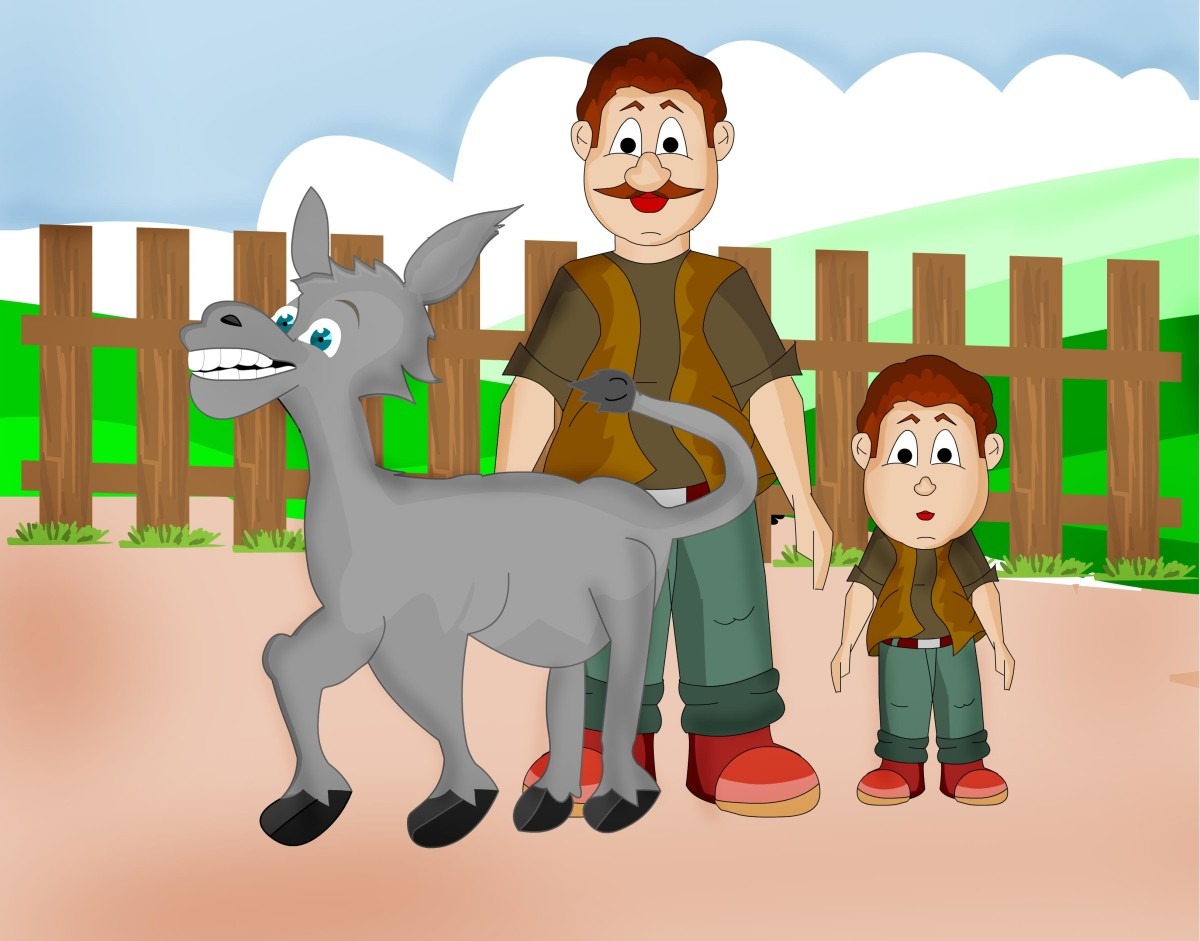
In a peaceful village nestled amid rolling hills, there lived a miller named Thomas and his young son, Daniel. Together, they owned a strong and loyal donkey that helped them carry sacks of grain to the mill.
One morning, Thomas and Daniel set out for the market with their donkey. As they walked along the dusty road, they heard the whispers of the villagers as they passed by. “Look at that foolish miller and his son! They have a perfectly good donkey, yet they’re both walking.”
Concerned about the villagers’ opinions, Thomas decided to have Daniel ride the donkey while he walked alongside. “We must appear practical and wise,” he reasoned.
But as they continued, they encountered another group of villagers who scoffed, “What an ungrateful boy! He rides comfortably while his poor father trudges on foot.”
Troubled by this criticism, Thomas and Daniel exchanged places. Now, Thomas rode the donkey while Daniel walked. They thought they had found the perfect solution to avoid judgment.
Yet, their journey took them farther, and they encountered yet another group of villagers. “Shameful!” they exclaimed. “A grown man making his young son walk! How heartless!”
Perplexed and frustrated, Thomas and Daniel looked at each other. Unsure of what to do, they continued their journey, both now riding the donkey.
As they entered the market, the murmurs grew louder. “Look at that poor donkey!” people exclaimed. “It can barely carry the weight of both father and son.”
Feeling defeated and embarrassed, Thomas and Daniel descended from the donkey. They led it by its reins, walking side by side.
Finally, an old traveler who had observed their ordeal approached them. With a kindly smile, he said, “My friends, it seems you’ve been trying to please everyone, but in doing so, you’ve pleased no one, including yourselves.”
He continued, “Remember, no matter what you do, there will always be someone with a differing opinion. The key is to make choices based on your own values and needs, rather than seeking approval from others.”
Thomas and Daniel looked at each other and nodded, understanding the traveler’s wisdom. They thanked him and continued their journey, this time focusing on what was right for them, rather than trying to satisfy everyone’s expectations.
From that day on, Thomas and Daniel learned the importance of staying true to themselves and making decisions based on their own judgment. The story of the miller, his son, and the donkey became a lesson in embracing individuality and standing firm in one’s choices.
Moral: The story of the miller, his son, and the donkey teaches us the importance of staying true to ourselves and making decisions based on our own values, rather than seeking constant approval from others. It reminds us that trying to please everyone can lead to confusion and dissatisfaction, and that being authentic to our own beliefs is the path to contentment.
15. The Dog and His Reflection

In a serene countryside, there lived a clever and playful dog named Max. Max was known for his vibrant personality and boundless energy, which he shared with all the villagers. One day, while strolling by a clear pond, he noticed his reflection in the water.
Fascinated, Max leaned closer to the pond, his eyes fixed on his own image. He wagged his tail, and his reflection mimicked his every move. Max was delighted by this newfound playmate and decided to interact with it.
He barked at his reflection, and the echo of his bark filled the air. Max’s excitement grew as he continued to bark, jump, and dance, watching his reflection respond in kind. His playfulness and joy were infectious, and even the birds in the trees above seemed to join in the merriment.
However, as the day wore on and the sun began to set, Max felt a rumbling in his belly. He was hungry and longed for a delicious meal. He noticed a bone resting by the edge of the pond, and his mouth watered at the thought of savoring it.
With a determined look, Max decided to snatch the bone from his reflection, hoping to enjoy his meal in peace. He lunged forward, but the moment he touched the water, his reflection rippled and the bone disappeared.
Confused and disappointed, Max tried again and again, each time met with the same result. Frustration gnawed at him as he realized that he could never possess the bone, no matter how hard he tried.
Just then, an old and wise dog named Leo approached. He observed Max’s efforts and chuckled softly. “My young friend, you are chasing after an illusion. That bone is not real; it is a mere reflection, just like the image you see in the water.”
Max looked at Leo, his eyes wide with realization. “So, I’ve been chasing something that isn’t even there?”
Leo nodded. “Indeed. The lesson here is that sometimes, what we desire may seem within our reach, but in reality, it is unattainable. Instead of chasing after fleeting illusions, focus on what truly matters – the genuine and tangible aspects of life.”
Max thanked Leo for his wisdom and walked away from the pond, his head held high. As he left, he glanced back at the shimmering water, a wiser and more thoughtful expression on his face.
From that day forward, Max embraced each moment with a new perspective. He cherished the real joys of life – the warmth of the sun, the camaraderie of his friends, and the simple pleasures that brought him true happiness.
And so, the tale of the dog and his reflection served as a reminder that seeking substance over illusion was the path to contentment and fulfillment.
Moral: The story of the dog and his reflection teaches us to focus on the real joys and meaningful aspects of life rather than chasing after fleeting illusions or desires that may lead us astray. It reminds us that genuine happiness is found in embracing the present moment and appreciating what truly matters.
16. The Four Oxen and the Lion
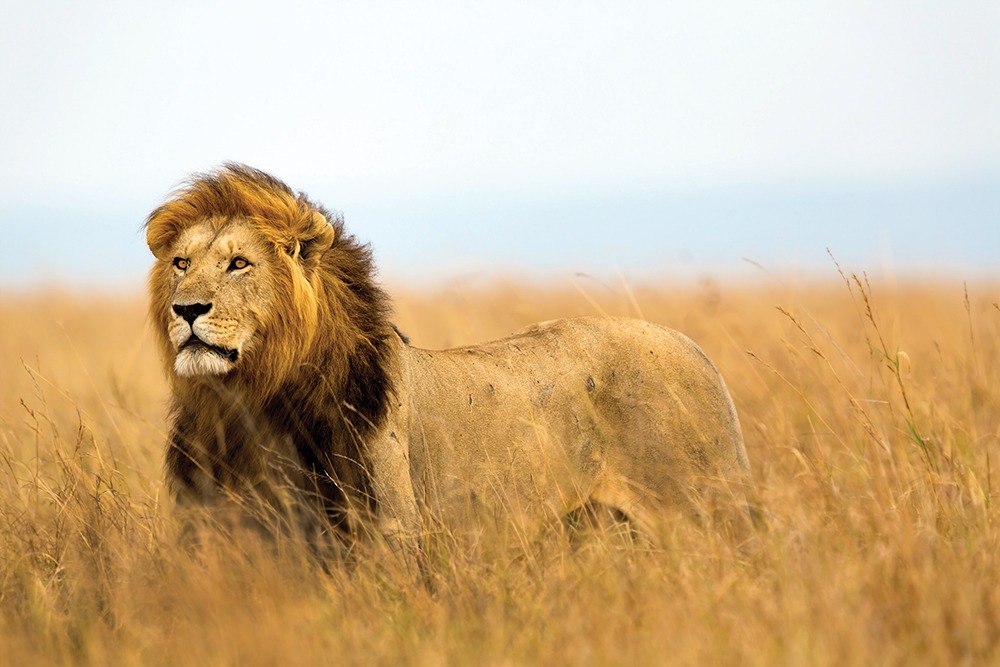
In a vast, sun-drenched field, four oxen named Oliver, Mia, Leo, and Ava peacefully grazed side by side. They were not only companions but also dear friends who shared stories, laughter, and the weight of their daily work.
One day, as the sun began its descent and painted the sky with hues of orange and pink, a mighty lion emerged from the nearby forest. Its powerful presence sent a shiver down the spines of the four oxen.
The lion’s eyes gleamed as it approached, its mouth watering at the sight of a feast before it. “I am the king of this land,” the lion declared. “And I demand that one of you surrender yourself to be my meal. In return, I will spare the others.”
Fear gripped Oliver, Mia, Leo, and Ava as they exchanged anxious glances. Each oxen considered sacrificing themselves to save the others, but none could bear the thought of leaving their friends behind.
Oliver, the eldest and wisest among them, stepped forward. “Mighty lion,” he began, “we understand your power, but we are bound by a bond stronger than fear. We have journeyed and toiled together, sharing the joys and burdens of life. We cannot abandon one another.”
The lion, taken aback by their unity and loyalty, paused to reflect. It had expected submission and fear, not this steadfast camaraderie. After a moment of contemplation, the lion spoke with a newfound respect, “You four oxen have shown me a truth greater than my own strength. Your unity and love for one another are admirable.”
With those words, the lion turned and disappeared into the forest. The four oxen watched it go, a mix of relief and gratitude filling their hearts.
In the days that followed, the bond between Oliver, Mia, Leo, and Ava grew even stronger. They continued to work together, support one another, and cherish their moments of companionship.
Word of their unity and bravery spread far and wide, becoming a source of inspiration for creatures throughout the land. The tale of the four oxen and the lion served as a reminder that true strength lay not just in physical might, but in the power of unity, friendship, and unwavering loyalty.
Moral: The story of the four oxen and the lion teaches us the value of unity, friendship, and loyalty. It illustrates that strength and courage can be found not only in individual bravery but also in standing together and supporting one another in times of adversity.
17. The Peacock and the Crane
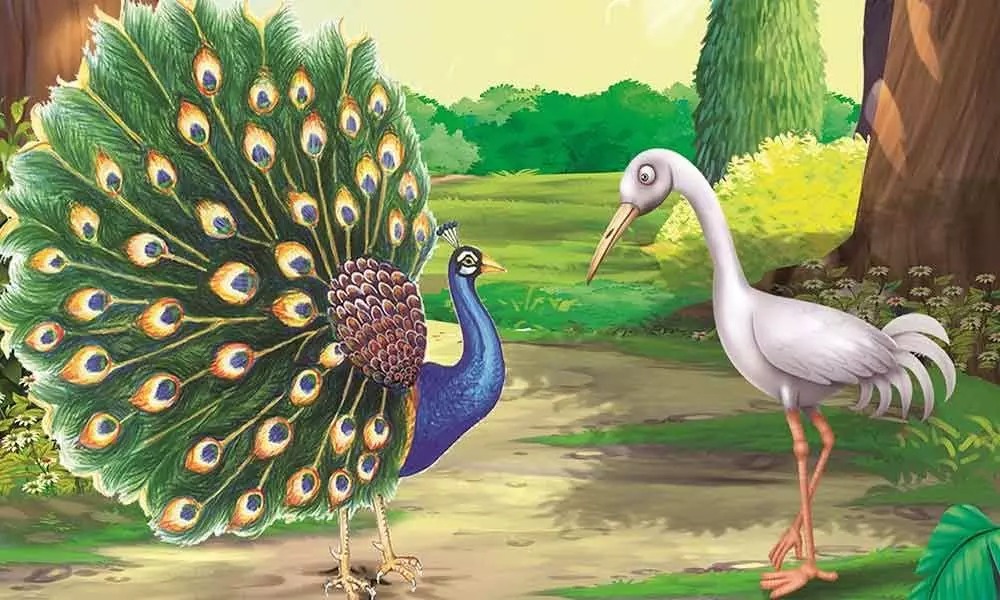
In a lush and vibrant forest, two birds of striking appearance lived side by side – a peacock named Percy and a crane named Clara. Percy was known throughout the forest for his magnificent and colorful plumage, which he proudly displayed to anyone who would look. Clara, on the other hand, had simple and unadorned feathers, but she carried herself with grace and humility.
One day, as they were enjoying the gentle rustling of the leaves and the soft caress of the wind, Percy turned to Clara and said, “Dear Clara, have you ever seen anything as splendid as my feathers? I am truly the most beautiful bird in all the forest.”
Clara smiled kindly and replied, “Your plumage is indeed magnificent, Percy, and it brings joy to those who behold it. However, true beauty goes beyond appearances. It lies in one’s character, actions, and how one treats others.”
Percy tilted his head, puzzled by Clara’s words. “But surely, Clara, you must envy my beauty. Your own feathers are plain in comparison.”
Clara shook her head gently. “Percy, I have come to understand that while appearances may capture attention, it is kindness, humility, and the ability to make others feel valued that truly define one’s beauty.”
Curious, Percy asked, “Do you think my beauty is meaningless, then?”
Clara replied, “Not at all, Percy. Your beauty is a gift, but it is how you use that gift that truly matters. A peacock’s true beauty is in the graceful way he carries himself, in his interactions with others, and in the kindness he shows.”
As time passed, Percy began to reflect on Clara’s words. He noticed how she helped the other birds find food and cared for the sick. He observed how her gentle nature brought comfort and joy to those around her.
One day, as the forest echoed with the songs of the birds, Percy decided to change his ways. He no longer flaunted his feathers in a boastful manner. Instead, he greeted his fellow creatures with humility and kindness, just as Clara did.
Over time, Percy’s actions spoke louder than his feathers ever could. He used his beauty to bring happiness and uplift the spirits of those around him. The forest began to admire him not just for his appearance, but for the genuine warmth and consideration he radiated.
And so, the peacock and the crane, once focused on appearances, learned the profound lesson that true beauty shines from within. Percy and Clara’s story served as a reminder that genuine beauty lies in how we treat others and in the qualities that make us kind, gracious, and humble beings.
Moral: The story of the peacock and the crane teaches us that true beauty is not solely based on appearances, but is found in the kindness, humility, and consideration we show towards others. It reminds us that our actions and character define our true beauty, making us shine from within.
18. The Ugly Duckling – moral stories in english
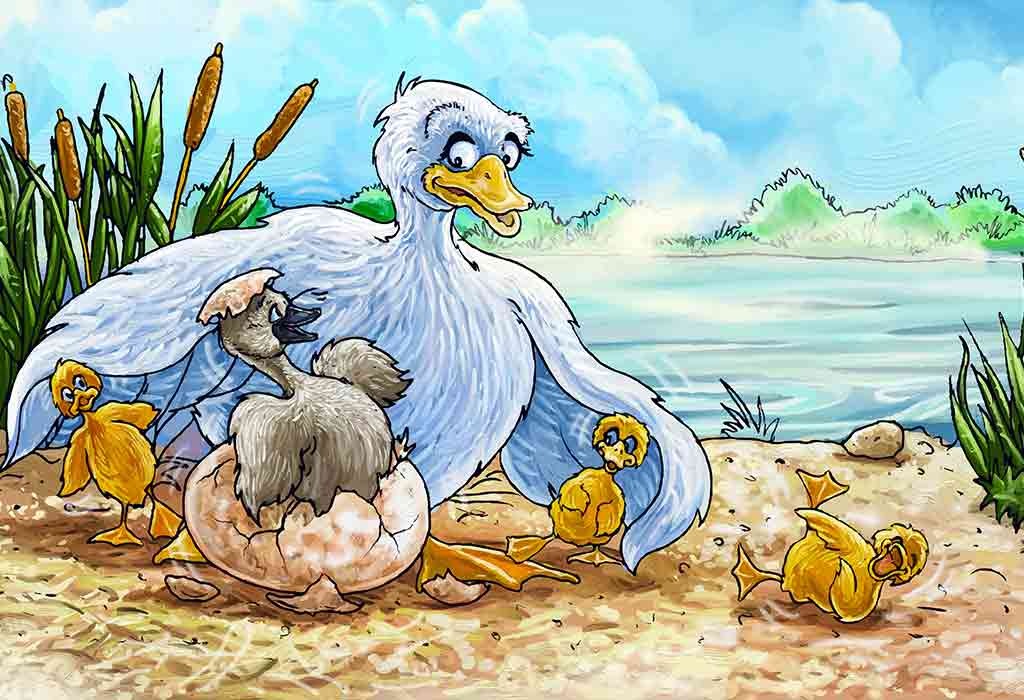
Once upon a time, on the serene banks of a shimmering pond, a mother duck eagerly awaited the hatching of her eggs. One by one, the eggs cracked open, and fluffy ducklings emerged. Yet, among them was one duckling that looked different – larger and clumsier than the rest, with gray feathers that set it apart.
As the days passed, the other ducklings would mock and tease the gray duckling, calling it “ugly” and “awkward.” Feeling dejected and out of place, the gray duckling would wander away, seeking solace in quiet corners.
Despite the unkindness it faced, the gray duckling held onto hope. It longed for a place where it would belong, where it would be loved and accepted for who it was. One day, as winter approached, the gray duckling decided to leave the pond and venture into the wider world.
Winter was harsh, and the gray duckling faced numerous challenges. It struggled to find food and warmth, and its path was marked by encounters with other animals who judged it based on its appearance. Each experience left the gray duckling feeling more isolated and disheartened.
Yet, as winter faded and spring arrived, something extraordinary began to happen. The gray duckling’s feathers started to change, revealing shades of white, brown, and soft gray. With each passing day, its once awkward form became sleek and graceful.
One sunny morning, the duckling gazed into the clear water of a pond and saw its reflection. To its astonishment, it no longer saw an awkward and gray creature, but a magnificent swan with elegant feathers and a regal presence.
As the swan mingled with other swans by the pond, it realized it had found its true family – a family that embraced and celebrated its unique beauty. The other swans welcomed the transformed duckling with open wings, and the gray duckling’s heart swelled with joy.
The swan looked back on its journey, understanding that its initial struggles had led to a remarkable transformation. It had learned that true beauty came from within, and that the opinions of others could not define its worth.
The story of the once “ugly duckling” spread far and wide, inspiring those who heard it to see beyond appearances and appreciate the inner qualities that made each being special. The swan’s journey from self-doubt to self-discovery became a timeless reminder that our true beauty lies in embracing and celebrating our unique selves.
Moral: The story of the Ugly Duckling teaches us that true beauty is not determined by outward appearances, but by the qualities that make us unique and special. It reminds us to embrace our individuality and to look beyond superficial judgments, for our true worth lies within.
19. The Honest Woodcutter
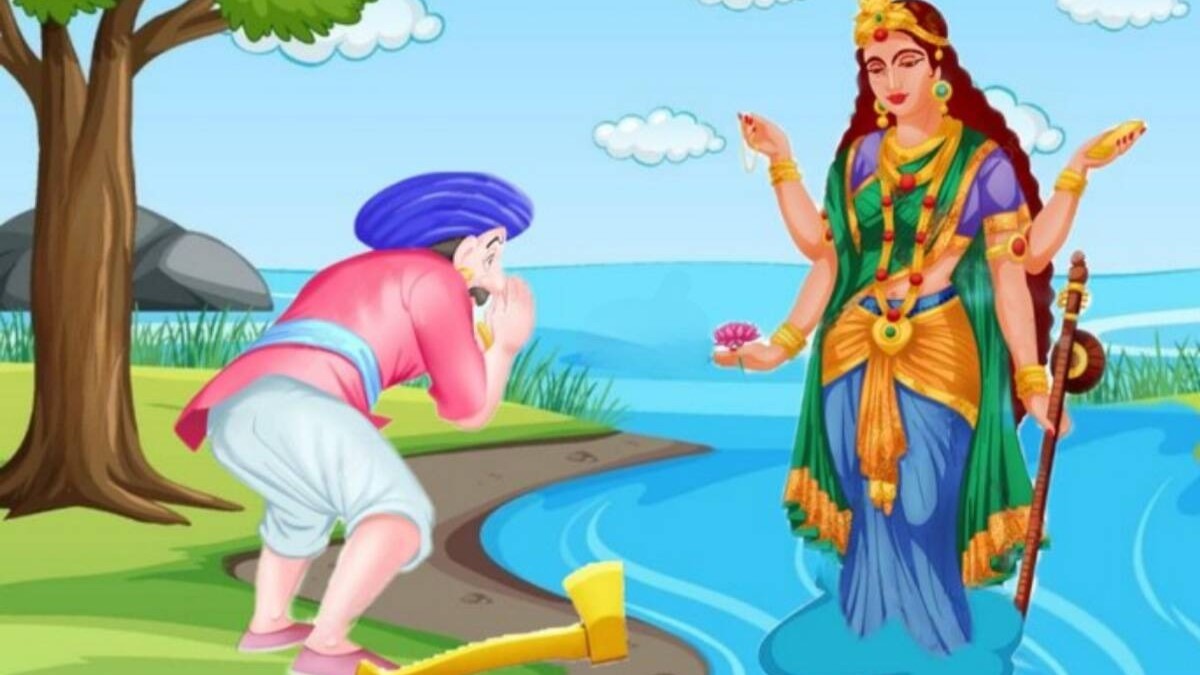
In a quiet village nestled amidst a lush forest, there lived a woodcutter named Ben. Ben was known far and wide not only for his exceptional skill in chopping wood but also for his unwavering honesty.
One day, as Ben was busy at work near a glistening stream, his axe slipped from his hands and plunged into the water. He watched in dismay as it disappeared beneath the surface, leaving him without the tool he depended on for his livelihood.
Desperate to recover his axe, Ben peered into the water, his heart sinking. Just then, a glimmer caught his eye – a shimmering light danced on the water’s surface. To his amazement, a kind and benevolent water spirit emerged, holding a dazzling golden axe in its hand.
“Is this your axe?” the water spirit asked, its voice like a gentle breeze.
“No, that’s not mine,” Ben replied truthfully. “Mine was a simple iron axe, not one as magnificent as that.”
The water spirit smiled appreciatively at Ben’s honesty. “You have proven your integrity, and for that, I grant you not only your own axe but also this golden one as a reward.”
With a wave of its hand, the water spirit summoned Ben’s iron axe from the depths of the stream. Ben’s heart swelled with gratitude as he held his own axe in one hand and the golden axe in the other.
As the water spirit returned to the depths, Ben walked back to the village carrying his newfound treasures. He shared his tale with the villagers, who were inspired by his honesty and the reward it had earned him.
Word of Ben’s encounter with the water spirit spread, and his reputation for honesty grew stronger. He continued to work diligently, his golden axe a reminder of the value of truthfulness.
Years passed, and Ben’s honesty not only earned him the respect and trust of the villagers but also the admiration of the neighboring communities. He became a symbol of integrity, a living example of the profound impact that honesty could have on a person’s life.
The story of the honest woodcutter, Ben, became a timeless reminder that honesty is a treasure more valuable than gold. It served as a beacon of light, guiding all who heard it to embrace truthfulness in their own lives and to recognize that integrity was a source of true richness.
Moral: The story of the honest woodcutter teaches us that honesty is a precious and invaluable virtue. It reminds us that being truthful, even in the face of challenges, can lead to rewards that are far greater than material possessions. Honesty is a treasure that enriches both the individual and the world around them.
20. The Little Red Hen – moral stories in english
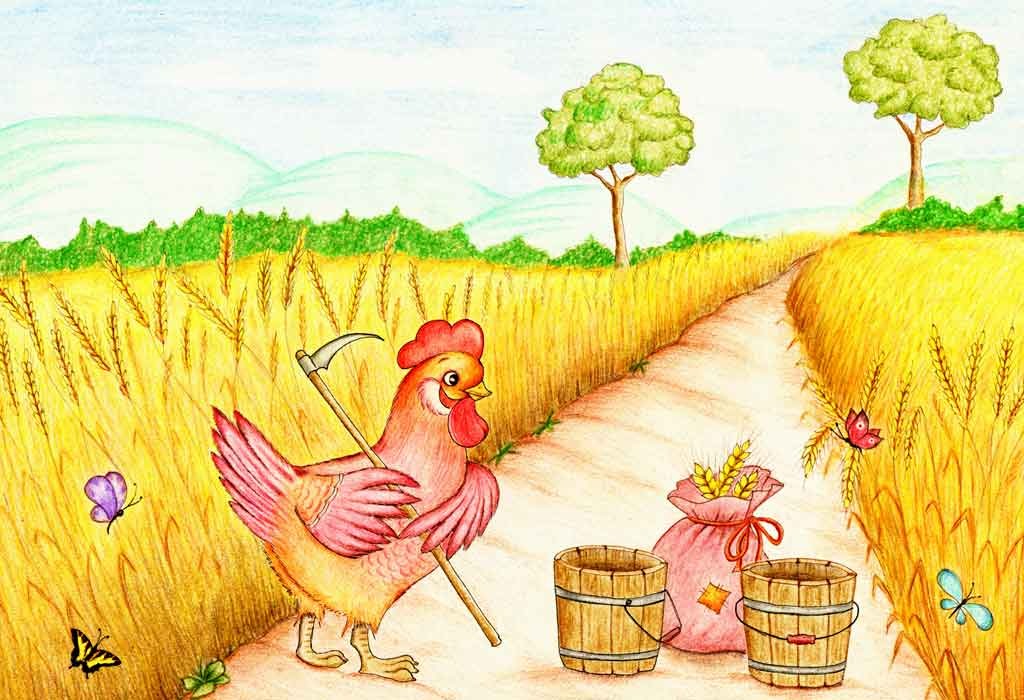
In a picturesque farm nestled at the edge of a rolling meadow, lived a diligent and resourceful little red hen. The little red hen spent her days tending to her garden and caring for her chicks. She was known for her tireless work ethic and her determination to provide for her family.
One sunny morning, as the golden rays of the sun bathed the farm in warmth, the little red hen stumbled upon a pile of wheat grains scattered on the ground. Eager to make the most of this unexpected find, she thought of a wonderful idea – she would plant the wheat and grow her own crop.
With unwavering determination, the little red hen asked her barnyard friends, “Who will help me plant this wheat?”
The lazy dog, the drowsy cat, and the carefree duck all replied in unison, “Not I!”
Undeterred, the little red hen set to work. She tilled the soil, planted the seeds, watered the ground, and watched over the growing crop with loving care. As the days turned into weeks, the wheat flourished under her diligent efforts.
When the wheat was ripe and ready for harvest, the little red hen once again turned to her barnyard friends and asked, “Who will help me harvest this wheat?”
The lazy dog, the drowsy cat, and the carefree duck repeated their refrain, “Not I!”
Undaunted by their lack of assistance, the little red hen gathered the ripe wheat, threshed it, ground it into flour, and finally baked a batch of fragrant, golden bread. The aroma wafted through the farm, enticing the attention of her barnyard companions.
As the little red hen took the freshly baked bread out of the oven, she once again turned to her friends and asked, “Who will help me eat this bread?”
The lazy dog, the drowsy cat, and the carefree duck, their mouths watering, chimed in, “I will!”
But the little red hen shook her head and responded firmly, “No, you will not. I will enjoy the bread I have worked so hard to create, along with my chicks who have helped me along the way.”
The barnyard friends, realizing the value of the little red hen’s efforts, were left reflecting on their choices. They had been quick to enjoy the rewards without contributing to the work.
The story of the little red hen became a timeless lesson in the importance of effort, responsibility, and cooperation. It reminded all who heard it that the rewards of hard work were not only satisfying but also enriched by the knowledge that one had earned them through dedication and diligence.
Moral: The story of the little red hen teaches us the value of effort, responsibility, and cooperation. It underscores the principle that those who are willing to put in the work and contribute to a task are the ones who truly deserve to enjoy its rewards.
Also Read :
moral stories in telugu : నీతి కథలు చదవండి

